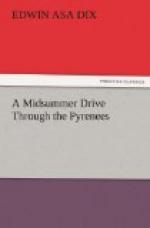“His eyes from bleeding are dimmed
and dark,
Nor mortal near or far can mark;
And when his comrade beside him pressed,
Fiercely he smote on his golden crest;
Down to the nasal the helm he shred,—
But passed no further nor pierced his
head.
Roland marveled at such a blow,
And thus bespake him, soft and low:
’Hast thou done it,
my comrade, wittingly?
Roland, who loves thee so dear, am I;
Thou hast no quarrel with me to seek?’
Oliver answered: ’I hear thee
speak,
But I see thee not. God seeth thee.
Have I struck thee, brother? Forgive
it me.’
’I am not hurt, O Olivier,
And in sight of God I forgive thee here.’
Then each to each his head hath laid,
And in love like this was their parting
made.”
And now but Roland and the Archbishop were left,—the former on foot, his charger dead. Wounded and gasping, they rushed forward upon the enemy; the sword-arm of the Moorish king was cut from his side, his son fell dead before him. The Moors quailed; their lances fell in storms upon the heroes. Suddenly a long, far sound was heard; it was of the trumpets of Charlemagne’s returning army rushing to the rescue but still miles and hours away. The Saracens turned at the very sound; a final lance-shower, and they fled; the two held the pass of Roncesvalles, unconquered,—but dying.
For it was too late.
The Archbishop had sunk to the ground, gasping,—lifeless. Roland, stricken himself, placed his companion gently on the grass:
“He took the fair white hands outspread,
Crossed and clasped them upon his breast.”
Then with his remaining strength, he sought one by one for the corpses of the other ten paladins; one by one he brought them to the feet of the dead prelate and laid them before the august body,—Oliver’s corpse last and dearest of all. There he might leave them, the solemn assembly of the peers. It was his last task. His wound too was mortal; his time had come to join them.
“In vigor and pathos,” justly observes the review before mentioned, “this poem rises to the end. There are few things in poetry more simply grand than the death of Roland. He moves feebly back to the adjoining limit-line of Spain,—the land which his well-loved master has conquered,—and a bow-shot beyond it, and then drops to the ground:”
“That death was on him he knew full
well;
Down from his head to his heart it fell.
On the grass beneath a pine tree’s
shade,
With face to earth, his form he laid;
Beneath him placed he his horn and sword,
And turned his face to the heathen horde
Thus hath he done the sooth to show
That Karl and his warriors all may know
That the gentle Count a conqueror died.
‘Mea culpa,’
full oft he cried,
And for all his sins, unto God above
In sign of penance he raised his glove.




